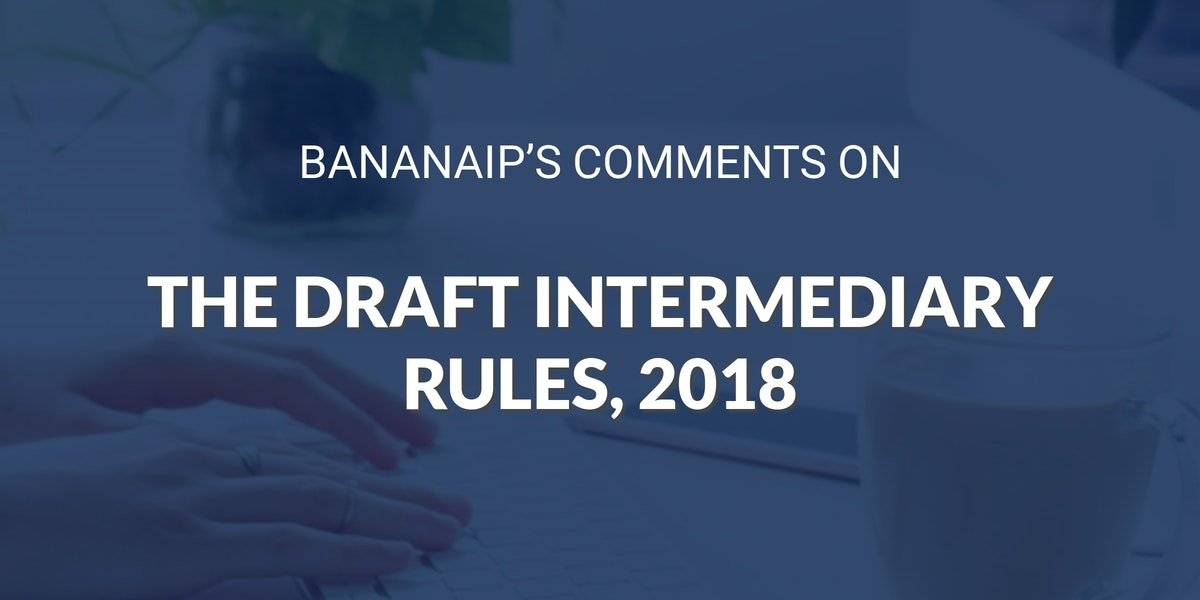The Ministry of Electronics and Information Technology (MEITy) issued a notification on 24th December 2018 publishing the draft Information Technology (Intermediary Guidelines) Rules 2018 to replace the rules notified in 2011. The notification, published on the MEITy website, invited comments and suggestions on the draft rules. BananaIP has submitted its recommendations and suggestions to the Ministry, and awaits positive changes in the proposed rules.
We appreciate the Ministry’s recognition of the widespread misuse of social media platform to spread fake news, and the Ministry’s resolve in drafting these rules to strengthen the legal framework to make intermediaries more accountable under the IT Act, 2000.
We noticed that certain provisions of the proposed rules are ambiguous and insufficiently detailed and hence suggested the following changes:
- Rule 3(2) requires an intermediary to impose certain obligations on its users through a user agreement. Despite the intent to tackle the menace of fake news, the amended Rule 3(2) does not contain any provision requiring the intermediary to prohibit the user from hosting, displaying, uploading, modifying, publishing, transmitting, updating or sharing any information which is false, fake, untruthful, misleading, and intended to deceive. We suggested the addition of a clause to this effect.
- Rule 3(4) requires an intermediary to inform its users regarding the consequences of non-compliance with its policies “at least once a month”. The Rule does not specify whether a mere notification on the intermediary’s platform is sufficient, or whether the intermediary is required to make the user proceed with using the platform only after clicking on “I Agree”. We recommended that the Rule be amended to require express notice, and that intermediaries be required to take action against users who repeatedly violate the terms of use.
- Rule 3(5) requires the intermediary to comply with requests for information from government agencies. It contains only a narrow and restrictive list of circumstances in which the intermediary’s assistance may be required, and does not specify the formats in which transmitted information has to be traced. We recommended that the Rule be amended to include the other circumstances in which the intermediary’s assistance may be required, with a more flexible timeline. We also recommended that the Rule be amended to clarify the extent to which the intermediary is required to enable tracing of the originators, and whether the tracing extends to all forms in which a specific piece of information may be shared.
- Rule 3(7) requires that an intermediary which has more than 50 lakh users in India comply with certain conditions, but does not clarify how the number of users is to be measured. We recommended that the Rule be amended to clarify how the number of users is to be measured, revise the number of users, and clearly specify the minimum qualifications of the nodal person of contact and the alternate senior designate functionary.
- Rule 3(9) imposes a positive obligation on the intermediary to monitor all content made available on its platform, to enable it to identify and remove all unlawful information or content. However, the Rule does not define the meaning or scope of the term “unlawful information or content.” We recommended that this Rule be deleted from the Draft Rules, as it neither addresses the problem of fake news, which these Rules seek to address, not does it provide any clear guidance to either intermediaries or third-parties on how unlawful content is to be handled.
- Rule 3(12) requires an intermediary to publish information on how users or third-parties may contact its Grievance Officer, and requires the Grievance Officer to redress a complaint within one month from the date of its receipt. However, the Rule does not clarify the process through which an intermediary is required to handle a complaint, and does not impose any obligation on the complainant to submit a complaint containing all necessary information, including the link to the content in question. We recommended that the Rule be amended to include a framework which every intermediary is required to adhere to while handling complaints. We also recommended that the Rule be amended to require the complainant to submit certain information, in the absence of which the complaint would not be treated as complete and valid, and the intermediary would be under no obligation to address such complaint.
We also recommended that the Rules be amended to address issues arising when intermediaries operate as data fiduciaries and e-commerce platforms, in order to harmonise the compliance requirements of data protection laws and e-commerce regulations. The complete text of the comments and recommendations submitted by BananaIP to the Ministry may be accessed here.
This post is authored by Ashwini Arun (Associate, BananaIP Counsels).
If you have any questions, you may write to us at: [email protected]



